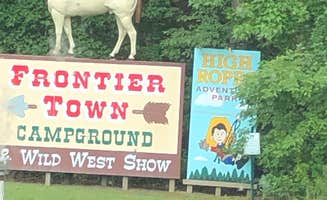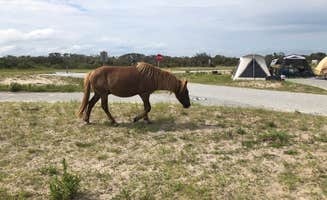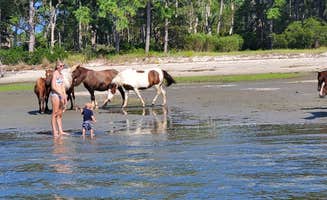Equestrian campgrounds near Parsonsburg, Maryland offer prime access to trails and beaches where riders can explore with their horses. Located on Maryland's Eastern Shore, this coastal region sits at approximately 20-30 feet above sea level with humid subtropical climate patterns. The riding season typically extends from September through May, with summer months bringing intense mosquito activity that can affect both horses and riders.
What to do
Kayaking through cypress trees: At Trap Pond State Park Campground, campers can paddle among rare northern stands of bald cypress trees. "We camped here several years ago but in the off-season, and wanted to kayak among the bald cypress trees (I highly recommend this)," notes Lee D. The pond offers rentals during peak season or you can bring your own watercraft to explore.
Beach riding with permits: For equestrians seeking waterfront trails, the beaches at Assateague Island National Seashore Oceanside Campground require proper documentation. "Beach camping is awesome if you have a self contained vehicle that is 4x4. A permit is required but it's for 12 months," shares Sean R. Horse tracks are visible throughout the sand in morning hours.
Wildlife observation: The marshlands surrounding Parsonsburg provide excellent birdwatching opportunities. "We walked around the pond and rented boats and kayaks for the day and rowed back to our site which the kids loved," says Lucia B. about her experience at Trap Pond State Park. Early morning hours offer the best chance to spot migratory birds and local wildlife.
What campers like
Private beach access: Equestrian campers appreciate the direct beach access at Delaware Seashore State Park Campground. "Ocean was a short 5 minute walk from our campsite- along with a playground and delicious restaurant," reports Gayle B. While sites lack shade, the proximity to water makes up for it.
Winter camping options: Unlike many seasonal facilities, some parks near Parsonsburg remain open year-round. "This place has been great to us even though we are tent camping in the middle of winter we have still made it work it has great warm bathrooms that are very clean and sanitary," explains Alisha M. about Trap Pond State Park. This extends the equestrian camping season beyond summer months.
Natural encounters: The chance to see wild horses draws many to the area. "We took a ride over to the ocean camp sites and found some horses! Worth a stop just for the simplicity of it all!" shares Deanna G. about her stay at Bayside Assateague Campground. Campers often report horses visiting their sites overnight, leaving tracks visible by morning.
What you should know
Bug preparation is essential: Biting insects can be overwhelming, particularly in warmer months. "Be prepared for the bugs. Even enjoyed this in the winter," advises Michael W. about Assateague. Bringing appropriate repellents, screened shelters, and timing your visit for cooler months makes a significant difference.
Horse interactions require caution: When camping at equestrian sites, secure food storage is critical. "A small herd of them (around 8) decided to hangout in our campsite waiting for their meal. This meant we couldn't get ours," reports Wendy W. from Bayside Assateague. Store all food items in vehicles or provided storage boxes.
Seasonal flooding: Low-lying campsites can experience water issues during rainy periods. "When we were there, they were delivering a new bath and shower facility to one of the loops," observed Lee D. at Tom's Cove Park. Some campgrounds have improved drainage systems, but choosing elevated sites remains advisable.
Tips for camping with families
Free bike programs: Families appreciate campgrounds that offer complimentary bicycle use. "Bike rentals are free (donations accepted), there are several hiking/biking/horse trails, disc golf, and canoe/kayak/peddle boat rentals," notes Lee D. about Trap Pond State Park. This helps families explore without bringing extra equipment.
Educational opportunities: Several parks feature nature centers with hands-on learning. "Has a Nature Center, very nice campground and clean bath houses. Has events for children for Easter and at the Nature Center," mentions Penny K. about Sun Outdoors Frontier Town. Programs often include guided walks focused on local wildlife.
Swimming alternatives: When ocean conditions are rough, protected swimming areas offer safer options. "They have a water park that is included in your stay. The activities are great and your only minutes away from ocean city or Assateague State Park," explains Dawn T. about Frontier Town. These facilities typically operate from Memorial Day through Labor Day.
Tips from RVers
Site selection strategy: RVers recommend researching specific site dimensions before booking. "Sites are fairly spacious and have an interesting semi-circle pull through layout so backing in not required. They are not level and have a sandy base so it took a bit of work to finally get the rig level, even with auto-levelers," shares Jim G. about Trap Pond State Park.
Wind protection needs: Coastal campgrounds experience significant winds. "Gorgeous, wild and windy! We camped in the Oceanside loop B. Right on the beach, but big dunes between sites and the ocean," reports Danielle from Assateague Island. Position RVs with doors away from prevailing winds and bring extra stabilizers for awnings.
Water access considerations: For equestrian campers with horse trailers, Martinak State Park Campground offers suitable parking. "Very clean. Great amenities! On the water. You can rent canoes. Sites do not have sewer but does have dump," notes Chris O. The water access points accommodate both horses and humans with adequate staging areas.





